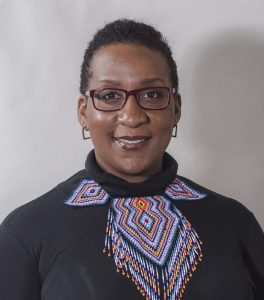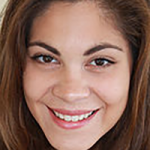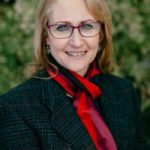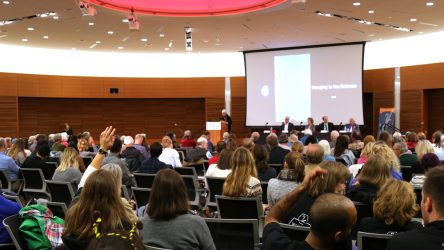Two panels at the Wisconsin Science Festival will closely examine the relationship between science and society, conversations which are sure to impact the future of science. The panels, the first on representation and inclusion and the second on science in entertainment and the arts, are part of the statewide festival that runs Oct. 17 through 20.
Laura Heisler, director of the Wisconsin Science Festival, sees great value in exploring both topics at the festival. “With both of these panels, we are hoping to continue our recent trend of fostering conversations on aspects of science that are important for society as a whole and students, faculty, and staff at UW-Madison in particular,” says Heisler. “Whether the topics relate to equity of opportunities in STEM, cultural norms or fresh perspectives, we design these sessions to be accessible to the university community. They take place during the course of the school and work day to encourage the campus community to participate.”
The first event, Who Owns Science? Representation, Inclusion, Culture and the Scientific Enterprise, will feature a diverse group of voices exploring how we can expand our understanding of science, technology, engineering, and math (STEM) on Thursday, Oct. 17, from 2 to 3:30 p.m. in the H.F. DeLuca Forum at the Discovery Building, 330 N. Orchard St.
“This conversation is an important one to have across society as a whole, to acknowledge the origins of many current paradigms of STEM and how those models have missed representing the myriad ways populations have contributed to scientific knowledge and understanding throughout human history.”

Rabiah Mayas, associate director of Northwestern University’s Science in Society research center, will moderate the panel. Mayas notes that positioning this panel early in the festival helps to set the stage for conversations throughout the following days. “The first day of gatherings can absolutely set a tone for the rest of the event and raise ideas for participants to consider throughout the week,” says Mayas. “This conversation is an important one to have across society as a whole, to acknowledge the origins of many current paradigms of STEM and how those models have missed representing the myriad ways populations have contributed to scientific knowledge and understanding throughout human history.”
Mayas will be joined on stage by Cheryl Bauer-Armstrong, director of the UW–Madison Earth Partnership; Lori Lemieux, Indigenous Arts & Sciences Coordinator at the Bad River Education Department; Dorothy Lsoto, a graduate student at the Nelson Institute for Environmental Studies; Michelle Allness from the Wisconsin Department of Natural Resources; Reynaldo Morales, a graduate student in the School of Education; and Ginger Contreras, executive director of the Wisconsin Institute for Discovery’s Illuminating Discovery Hub.
The panel will discuss what participation in science looks like in our culture and how excluding practices and perspectives from non-white, non-dominant cultures and legacies can be a detriment to scientific endeavor.
“If you are a learner from a non-western cultural, language, or learning perspective, it’s easy to get lost in western teaching structures,” says Contreras. “If you are able to succeed, it requires walking two worlds of learning and cultural practice or sacrificing one world of thought. What if instead the worlds were merged to support one another?”


Contreras will also participate in a second panel, Science in Entertainment and the Arts: The Most Powerful Way to Communicate Science, a day later on Friday, Oct. 18 from 2 until 3:30 p.m. in the same location. She will be joined by Elizabeth Kilpatrick of the Geena Davis Institute, Emory University’s David Lynn, UW–Madison artist-in-residence Carrie Hanson, and Michael Graf of Spot Filmworks. The discussion about how scientists can engage with the public through entertainment and the arts will be moderated by the director of the Wisconsin Institute for Discovery, Jo Handelsman.
“It’s important to begin thinking more seriously than we have in the past about how we present science in entertainment media,” says Handelsman. “The images of science and scientists are critical for changing attitudes toward science, particularly for kids.”
The perspectives represented in the afternoon panel create space for meaningful conversations about the relationship between science and entertainment media, especially film. “I think it’s important that we have people from the film industry, people who study the film industry, and academic scientists all engaged in this panel. It will provide a very provocative collection of views.”
Following the panel, Michael Graf and David Lynn will lead a breakout discussion about scientists and playwrights joining forces to create science-based scripts.
The Wisconsin Science Festival includes more than 250 events across the state of Wisconsin and is produced by the Wisconsin Alumni Research Foundation, the University of Wisconsin–Madison, the Morgridge Institute for Research, and the Wisconsin Institute for Discovery.
—Nolan Lendved


You must be logged in to post a comment.